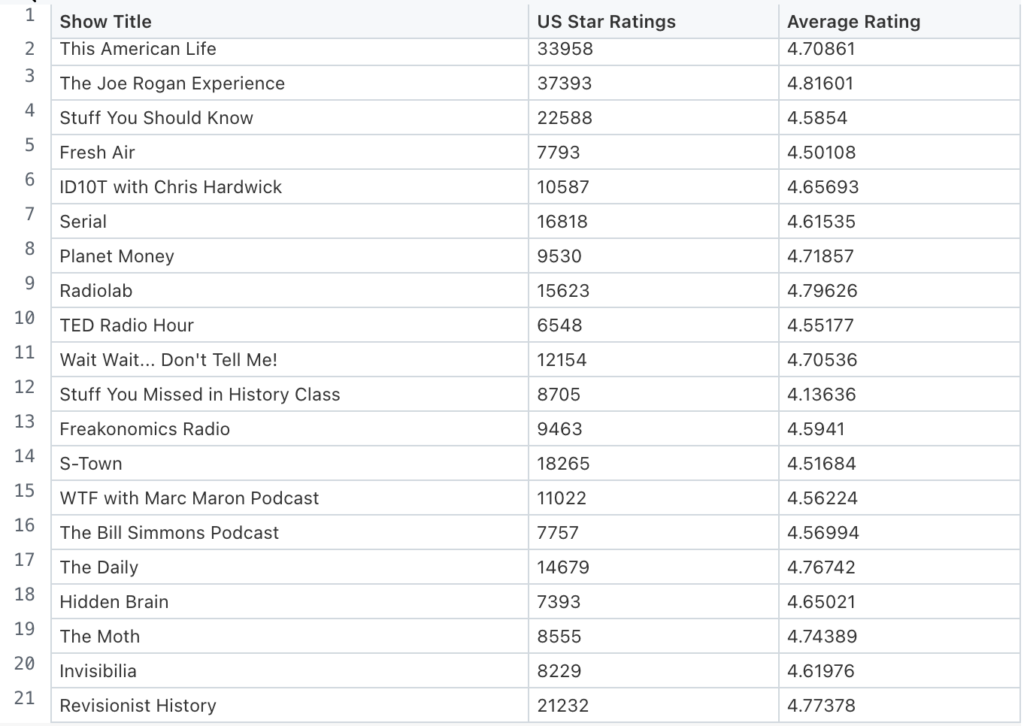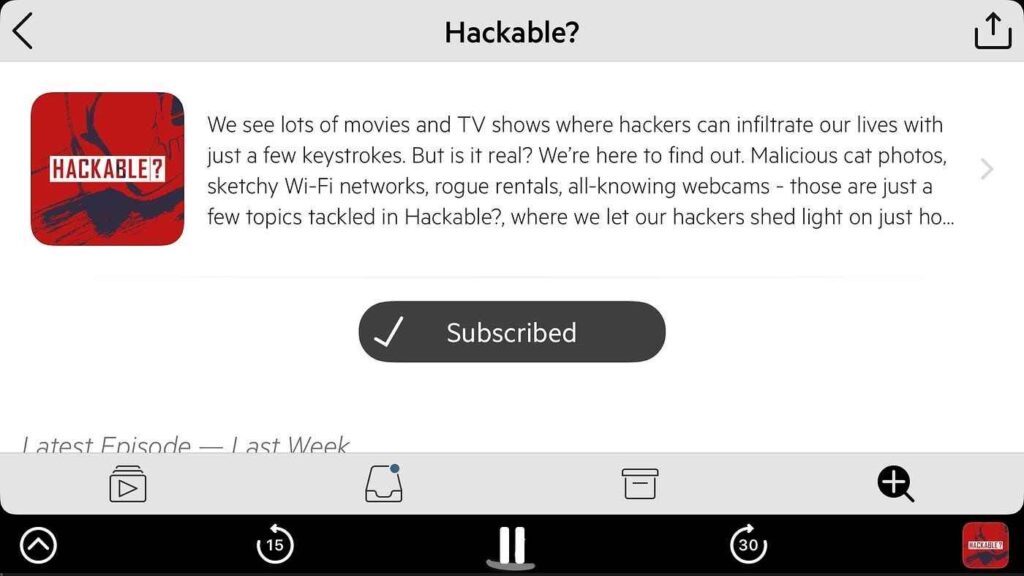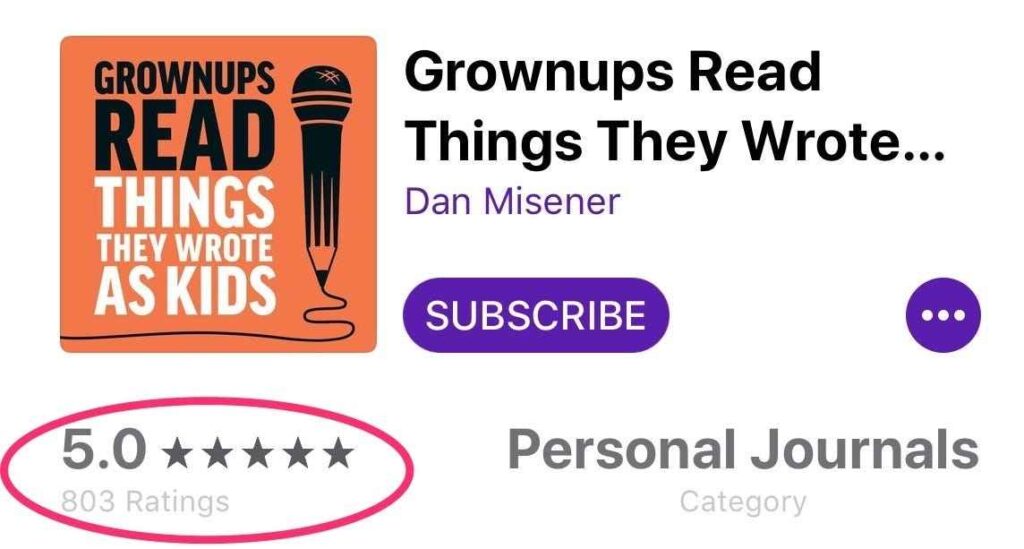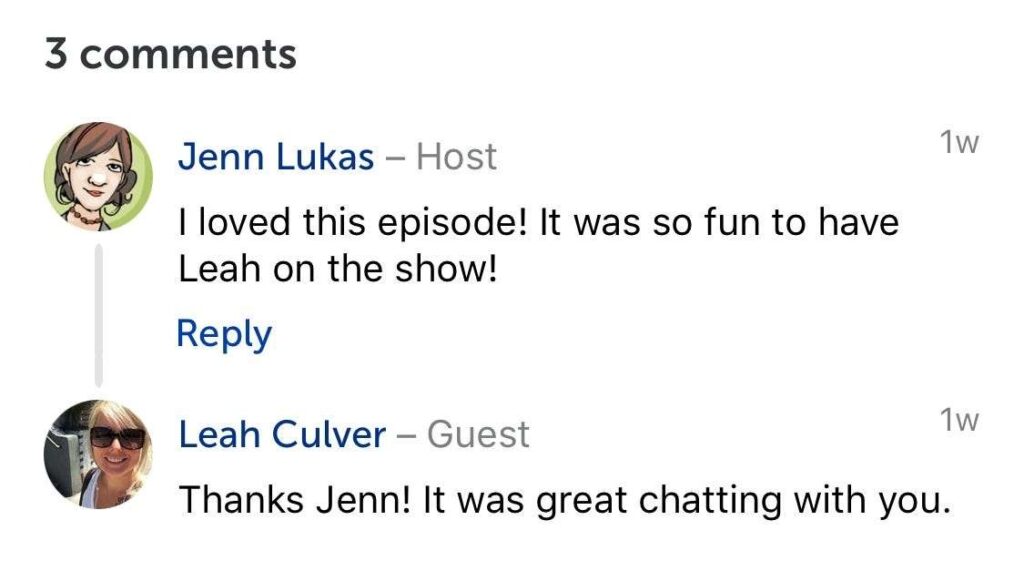Do podcasters really need to beg for ratings and reviews ⭐⭐⭐⭐⭐?
You could call it a thought virus. Or podcasting’s most enduring meme.
“If you like this show, remember to leave us a rating or review. It really helps.”
You’ve probably heard this dozens (or hundreds) of times.
But just how important are in-app ratings and reviews? Do they live up to the oft-repeated claim of helping a show’s visibility?
Or are these CTAs just an ineffective podcast trope?
I asked a few podcast app makers what they think. Here’s what I learned.
Some apps include ratings and reviews in their discovery algorithms. Other don’t.
Apple Podcasts
In Apple Podcasts, top-performing shows tend to have huge rating counts. For instance, This American Life has almost 34,000 ratings in Apple Podcasts US:

Of course, correlation ≠ causation. These series perform well because they’re high-quality shows that add value to listeners’ lives… not because they managed to get tons of star ratings.
At Pacific Content, we have not seen conclusive evidence that ratings or reviews directly contribute to chart performance, visibility, or editorial support from Apple Podcasts. They may factor into Apple’s charting algorithm, but we don’t know for certain, and Apple’s not saying.
However, some other apps are more transparent about how listener feedback is used in their podcast discovery features. For instance:
Breaker
Breaker is an iOS podcast app that aims to make listening social. Listeners can leave likes and comments on individual episodes, and according to Breaker’s Leah Culver, those likes and comments factor directly into their “Hot Episodes” list:
For each episode, we compute a popularity score based on the weight of the type of feedback and the amount of feedback. For example, a “like” by a Breaker user is weighted more heavily than a listen. The Hot Episodes are the episodes with the highest popularity scores for that day, week, and month.
CastBox
You can also find episode-level likes/hearts at CastBox.FM, a cross-platform podcast app that boasts 15 million users worldwide. CastBox’s Peter Vincer told me these feedback features don’t yet factor into the app’s Top Shows list, but will soon.
“We are currently working diligently to bolster our recommendation algorithms and this is part of the ultimate solution,” he says.
Not all podcast apps have ratings or reviews

Some podcast apps don’t include ratings or reviews at all, including well-known apps like Pocket Casts and Marco Arment’s Overcast.
I asked Pádraig Ó Cinnéide from Supertop why their podcast app Castro doesn’t include ratings.
“When we launched the app in 2016 we didn’t feel that we had a large enough user base to have a meaningful number of reviews/ratings,” he says. “We would show the iTunes ratings if Apple made them available through their search API, which they don’t at present. We are planning on changing the business model this year to one that should bring in a lot more users, so ratings are something we might consider in future.”
RadioPublic is another prominent app that does not include ratings. RadioPublic’s Ma’ayan Plaut explains why:
Podcast reviews are one signal to help listeners decide if they want to hear a show, but during our user interviews, particularly with people new to podcasts, we found engaging, visually interesting podcast art and the name of the show to be most important. What we also learned during our app prototyping was that people would just tap play and start listening to episodes. RadioPublic was designed so that you can listen without having to first make a decision to subscribe to a show, since people would just start listening to episodes to see if they liked what they heard.
Ratings and reviews are social proof
At Pacific Content, we believe ratings and reviews are always worth asking for… even if they don’t factor into an app’s discovery algorithm.
Why? Because ratings and reviews are social proof. Like star ratings on Amazon, or written reviews on Airbnb, your show’s ratings and reviews are a public-facing signal of quality:

Ma’ayan Plaut from RadioPublic says feedback can be a form of public validation:
I have seen no evidence that an increase in ratings and reviews helps new listeners find a show, though it could be a deciding factor in someone choosing to press play to listen to that show for the first time — a socially validated nudge that serves as a digital expression of the word-of-mouth nature of much of today’s podcast discovery. A review or rating is a social confirmation that yes, someone else has heard this show and can give a useful sense of what can expect when a listener first presses play on an episode.
Like it or not, ratings and reviews are part of your podcast’s packaging.
Want more ratings and reviews?
If you decide you want to solicit ratings and reviews for your podcast, here’s how to ask for them:
1. You can’t get what you don’t ask for
In addition to building Castro, Pádraig Ó Cinnéide hosts Supertop Podcast — a show about indie software development. I’m a regular listener, and I’ve heard Pádraig and co-host Oisín Prendiville solicit reviews in Apple Podcasts. I asked Ó Cinnéide about the oft-repeated CTA “Please remember to rate and review the show. It really helps new listeners find us.”
“We’ve said something like this a few times on our podcast and it did produce a few reviews,” he says, “But I have no idea if it had any impact on people finding our show.”
At Pacific Content, we’ve seen ratings and reviews spike after in-episode CTAs, but like the team at Supertop, we haven’t seen conclusive evidence that it helps with discovery in Apple Podcasts.
2. Be genuine
Podcast listeners are savvy, and they can sniff out phoneys a mile away. As Castbox’s Peter Vincer says, “the more genuine and honest podcasters are with their fans/listeners about why they want feedback, the more engagement they will in turn receive.”
I asked Vincer if he’s seen any particularly effective CTAs, and he told me about Masters of Scale: “Reid Hoffman asks listeners to leave comments because ‘they read every one and it helps tremendously with improvements,’” he explains. “I think that type of messaging resonates with listeners.”
3. Encourage written reviews, not just star ratings
Ma’ayan Plaut from RadioPublic isn’t a big fan of star ratings: “If we could do away with ratings entirely, that’d be great,” she says. “Reviews, on the other hand, could be oh so much better: it requires words (about words recently heard!) that can help form a more complete picture of a show for listeners. A good review can help fill in the gaps between what a podcast does (or rather, doesn’t — or can’t) say about their own content.”
Rather than encouraging written reviews in siloed apps, Plaut suggests that podcasters
ask their audience to directly send a note to the show — email preferred, either written or as a voice memo, though social media works, too — and then channel those reviews into a podcast press kit or testimonials on a show’s website. This method is the lowest possible barrier to overcome for a listener to connect with a show, and it start to build a relationship between the podcaster and a reviewer, rather than the “swoop and poop” method popular all over the web of dropping in, saying your two cents, then dropping out form of commenting on or “reviewing” original content.
4. Engage back with commenters and reviewers

Reviews on Apple Podcasts are a one-way street, with no way for hosts or publishers to directly respond to listener feedback in-app. But apps like CastBox.FM and Breaker allow two-way communication, where podcast hosts can reply directly to listener comments. As Breaker’s Leah Culver explains:
It’s great when hosts engage with users on Breaker. Telling listeners during an episode to ‘like on Breaker’ is effective in getting more listens and likes, and moves the episode up the Hot Episodes charts. It’s not too surprising, but we’ve dug into the data and found that when an episode is high on the charts, it gets more Breaker users listening and subscribing to the podcast, increasing the show’s overall subscriber base.
Remember
- Ratings and reviews can be a valuable way to understand how your audience feels about your show.
- Ratings and reviews pay dividends, especially in apps where they count towards charting or discovery.
- Podcast ratings and reviews matter because they’re social proof. Think of them as part of your podcast’s packaging.
Finally… if you enjoyed this post, make sure to hit the “Clap” button, and remember to leave a rating or review in the comments below. It really helps people find the show.
![]()
Sign up for the Pacific Content Newsletter: audio strategy, analysis, and insight in your inbox. Once a week.
